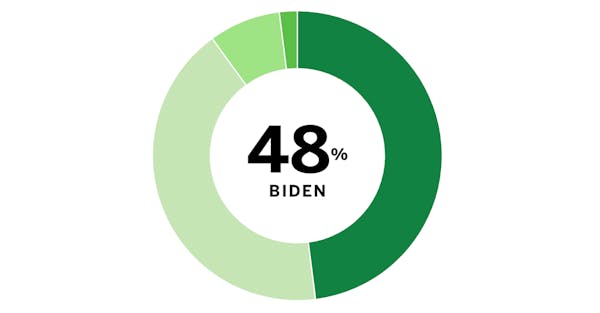A clear majority of likely Minnesota voters plan to cast their ballots in person on Election Day even as half say the state has adequate protections against mail-in voting fraud, according to a new Star Tribune/MPR News/KARE 11 Minnesota Poll.
Slightly more than a quarter of Minnesotans said they plan to vote by absentee ballots through the mail — roughly the same proportion that did so in the 2018 midterm elections.
Another 12% plan to drop off their ballots at officially designated sites before Election Day, while 61% still plan to vote in person at the polls on Nov. 3.
President Donald Trump and his allies continue to cast doubt on the legitimacy of widespread mail-in voting this November, and 41% of Minnesotans believe mail-in absentee ballots are vulnerable to tampering.
Trump has most forcefully called out initiatives to send ballots to every voter in certain states, an idea that was proposed but ultimately abandoned in Minnesota. Amid health and safety concerns during the COVID-19 pandemic, state election officials are instead mailing all registered voters absentee ballot applications as an alternative to voting at regular polling places on Election Day.
As of Friday, a record 1,246,810 Minnesotans had requested absentee ballots, according to the Secretary of State's office. More than a half million Minnesotans voted by mail in the August primary elections without incident.
While mail-in voting has grown in popularity across the nation, the Minnesota Poll revealed a deep divide between voters backing Trump and Democratic challenger Joe Biden. Seventy percent of Trump voters believe the state's mail-in voting process is susceptible to extensive fraud, while 72% of Biden voters believe the opposite.
Nearly 80% of Republicans said they plan to vote in person.
Cody Miller of Maple Grove, who plans to vote for Biden, says he is very confident that the voting system is secure and that research into the topic shows the threat of voter fraud is very small. He said the evidence is "greatly stacked" against Trump.
"It is in many ways, I think, a tactic," Miller, a 31-year-old data scientist, said of the president's criticism of mail-in voting. "I know that voter suppression from what I've seen is a huge problem in the United States. And to me this just seems like another way to disenfranchise people during a pandemic."
Ryan Pond, a 44-year-old engineering supervisor who plans to vote for Trump, said he is concerned about proposals to send voters unsolicited ballots in the mail. A handful of states, including California and New Jersey, will be doing that for the first time in the 2020 election — in addition to others that did so previously.
Pond lived until recently in Oregon, which votes almost exclusively by mail and sends all voters a ballot. But it is a longstanding and very organized system, he said. He is worried that an improperly designed system could result in someone else casting a ballot on his behalf.
Pond feels Minnesota's existing absentee voting system has appropriate safeguards. Though Pond plans to vote in person this November, his son at college requested an absentee ballot to vote by mail.
"Public opinion on mail-in voting was not bifurcated the way it is now until President Donald Trump started making it an issue," said Prof. Todd Belt of George Washington University's Graduate School of Political Management. "The mail-in voting has been pretty widely popular and pretty well trusted."
Belt said public opinion on the issue could prove important if courts are deliberating over legal challenges to the election.
"The courts are supposed to be immune to public opinion, but they are not. Courts depend upon the executive branch to enforce their decisions, whether that be at the state or the federal level," Belt said. "Courts are actually keenly aware of stepping too far out of bounds with what the public thinks."
The poll's findings are based on interviews with 800 likely Minnesota voters conducted between Sept. 21 and Sept. 23, just as early voting got underway. The poll's margin of error is plus or minus 3.5 percentage points.
The fraud question broke along geographic lines across the state. Just 28% of voters in Hennepin and Ramsey counties said they feel the mail-in voting process was vulnerable to fraud, compared with half of voters in the remainder of the Twin Cities metro area. Voters in northern Minnesota were the most skeptical of the mail-in process, with 52% saying it is susceptible to significant fraud.
Jean Ahrens, a 51-year-old college instructor from La Crescent, said she has confidence in Minnesota's mail-in system to handle the normal amount of absentee votes.
"But at this level, with this many people that are going to need to do it, I just don't know how they're going to get it done efficiently and without fraud," said Ahrens, who is undecided on the presidential race.
Fernando Almeida, a Biden voter in Minnetonka, said he has faith in the absentee voting system because Minnesota government services generally work well compared to other states he's lived, like New York, Illinois and Florida.
Almeida, a 52-year-old health care project manager, plans to vote by mail for the first time in this election due to coronavirus concerns.
Eric Roper • 612-673-1732
Twitter: @StribRoper






